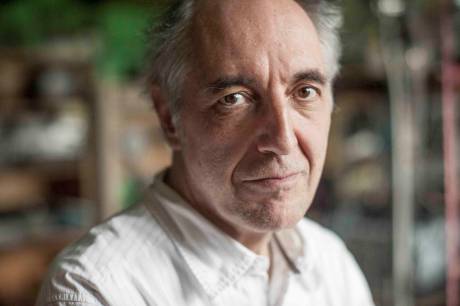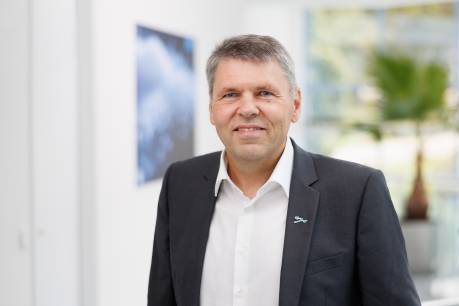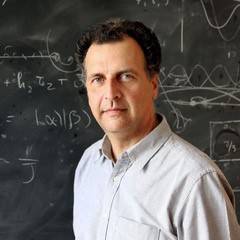Advisory Board
Astrid Lambrecht
Forschungszentrum Jülich

Astrid Lambrecht
Forschungszentrum Jülich
Astrid Lambrecht is physicist by training with a research focus on quantum physics. She has studied at Duisburg-Essen University and Imperial College London and received her PhD from Sorbonne University in Paris. After a postdoctoral fellowship at the Max-Planck-Institute for Quantum Optics in Garching she has held several positions at the National Scientific Research Centre (CNRS) in France, first as a junior research fellow, then from 2007 on as a research professor. Her research activities lie in the field of quantum optics and quantum fluctuations, with a particular focus on the Casimir effect, topic for which she initiated and coordinated a European network.
Since 2016 she has been active in research management and has joined the physics directorate at CNRS headquarters in Paris. Initially in charge of the atomic, molecular and plasma physics, optics and laser division, she became in 2018 head of the physics directorate, which comprises also research in solid-state physics, physics for life sciences, theoretical physics and several large-scale neutron, synchrotron and laser research facilities. Lambrecht has experience from numerous international scientific organizations and committees, such as the French National Research Agency, the American National Science Foundation, the British Engineering and Physical Sciences Research Council, the German Physical Society and the US Department of Energy. She serves in different supervisory boards and has been member of the Scientific Council of the French Parliamentary Office for Scientific and Technological Assessment.
Lambrecht’s most significant awards include the 2005 Aimé Cotton Award from the Société Française de Physique (SFP), the 2013 CNRS silver medal, and the 2016 Gentner-Kastler-Prize from the SFP and DPG. In 2019, she was also awarded the French Legion of Honour order of merit.
Since June 2021, she was member of the Board of Directors at Forschungszentrum Jülich where she was responsible for the Scientific Division I. In August 2023, Lambrecht was promoted to the new Chair of the Board of Directors.
Daniel Esteve
CEA

Daniel Esteve
CEA
Daniel ESTEVE is a member of the SPEC laboratory, a CEA research unit of the Paris-Saclay University. Together with Michel Devoret and Cristian Urbina, he founded the Quantronics group in the mid 1980s for developing mesoscopic physics and noticeably quantum mechanics of electrical circuits. His main works concern quantum tunnelling of a Josephson junction that first demonstrated that an electrical component can enter hequantum regime, single electron devices including the single electron pump or turnstile in which electrons are transferred one by one in a controlled way, the dynamical Coulomb blockade of tunnelling that was the first exemple of full quantum treatment of a non trivial electrical circuit, energy relaxation and decoherence processes of electrons in mesoscopic circuits, proximity superconductivity in nanostructures, quantum information processing with superconducting quantum bit circuits including a first fully fledged quantum rocessor, hybrid structures based on superconducting quantum bits and spin ensembles; ESR at the quantum sensitivity limit down to single spin detection; Quantum optics in the microwave domain.
He contributed to build the ERC, and was ERC vice-president elect from 2007 to 2012. He is member of the French academy of sciences.
References
Quantum Mechanics of a Macroscopic Variable: The Phase Difference of a Josephson Junction
John Clarke, Andrew N. Cleland, Michel H. Devoret, Daniel Esteve, and John M. Martinis
DOI: 10.1126/science.239.4843.992
Transferring Electrons One By One
Daniel Esteve
DOI: 10.1007/978-1-4757-2166-9_3
Manipulating the Quantum State of an Electrical Circuit
D. Vion, A. Aassime, A. Cottet, P. Joyez, H. Pothier, C. Urbina, D. Esteve, M.H. Devoret
DOI: 10.1126/science.1069372
Quantum speeding-up of computation demonstrated in a superconducting two-qubit processor
Andreas Dewes, Romain Lauro, Florian R. Ong, Vivient Schmitt, Perola Milman, Patrice Bertet, Denis Vion, and Daniel Esteve
DOI: 10.1103/PhysRevB.85.140503
Exciting Andreev pairs in a superconducting atomic contact
Bretheau, Ç. Ö. Girit, H. Pothier, D. Esteve & C. Urbina
DOI: 10.1038/nature12315
Bright Side of the Coulomb Blockade
M. Hofheinz, F. Portier, Q. Baudouin, P. Joyez, D. Vion, P. Bertet, P. Roche, and D. Esteve
DOI: 10.1103/PhysRevLett.106.217005
Detecting spins by their fluorescence with a microwave photon counter
Emanuele Albertinale, Léo Balembois, Eric Billaud, Vishal Ranjan, Daniel Flanigan, Thomas Schenkel, Daniel Estève, Denis Vion, Patrice Bertet & Emmanuel Flurin
DOI: 10.48550/arXiv.2102.01415
Why I joined the QSolid Advisory Board
QSolid features an impressive ensemble of teams committed to the same goal.
Michael Bolle
Carl-Zeiss-Stiftung

Michael Bolle
Carl-Zeiss-Stiftung
Dr Michael Bolle has a PhD in engineering and has held executive positions at Bosch since 1992 – except for a break from 1999 through 2002 to establish a high-tech startup. Most recently he was a Member of the Management Board of Robert Bosch GmbH, Chief Technology Officer (CTO), and Chief Digital Officer (CDO). During his time at Bosch, Dr Bolle was the driving force behind the creation of the Bosch Center for Artificial Intelligence and helped to link up the Internet of Things with artificial intelligence (AIoT).
As Chairman of the Shareholder Council of the Carl-Zeiss Foundation since January 2022, he acts as a link between the foundation and its companies ZEISS & SCHOTT and represents the economic interests of the Carl-Zeiss Foundation towards the foundation companies.
Michael Bolle has a strong interest in innovation and technologies and therefore contributed for several years to the field of quantum technologies. He currently serves as a speaker on the program committee of quantum systems of the Federal Ministry of Education and Research.
Why I joined the QSolid Advisory Board
QSolid is a great example of a cooperation project funded by BMBF to accelerate the development of quantum technologies in Germany. I look forward to supporting QSolid in the implementation of its mission and providing the necessary industrial perspective.
Rosario Fazio
International Center for Theoretical Physics

Rosario Fazio
International Center for Theoretical Physics
Rosario Fazio received his PhD in Physics in 1990 at the University of Catania. He is currently Head of the Condensed Matter and Statistical Physics Section of the Abdus Salam International Center for Theoretical Physics (Trieste) and Professor of Theoretical Condensed Matter Physics at the University of Naples "Federico II" . He is the Director of the Institute for Quantum Theoretical Technologies of Trieste.
He received the international "Luigi Tartufari" prize from the Accademia Nazionale Lincei in 2016, the "Google Quantum Research Award" in 2019, and an ERC Advanced Grant in 2022. From 2022 he is a corresponding member of Accademia dei Lincei.
His research interests are in theoretical condensed matter and quantum information processing focusing on quantum transport in nano-devices, mesoscopic superconductivity, quantum simulators, quantum information & many-body systems, open many-body systems.
References
Detection of Geometric Phases in Superconducting Nanocircuits
Giuseppe Falci, Rosario Fazio, G. Massimo Palma, Jens Siewert, Vlatko Vedral
DOI: 10.1038/35030052
Scaling of Entanglement close to a Quantum Phase Transitions
A. Osterloh, L. Amico, G. Falci, R. Fazio
DOI: 10.1038/416608a
Decoherence and 1/f Noise in Josephson Qubits
E. Paladino, L. Faoro, G. Falci, and Rosario Fazio
DOI: 10.1103/PhysRevLett.88.228304
Entanglement in Many-Body Systems
Luigi Amico, Rosario Fazio, Andreas Osterloh, Vlatko Vedral
DOI: 10.1103//RevModPhys.80.517
Measures of Quantum Synchronization in Continuous Variable Systems
A. Mari, A. Farace, N. Didier, V. Giovannetti, R. Fazio
DOI: 10.1103/PhysRevLett.111.103605
The power of a critical heat engine
Michele Campisi, Rosario Fazio
DOI: 10.1038/ncomms11895
Boundary time crystals
F. Iemini, A. Russomanno, J. Keeling, M. Schirò, M. Dalmonte, R. Fazio
DOI: 10.1103/PhysRevLett.121.035301
Hans Hilgenkamp
University of Twente
Hans Hilgenkamp
University of Twente
Marc Weber
Karlsruher Institut für Technologie
Marc Weber
Karlsruher Institut für Technologie
